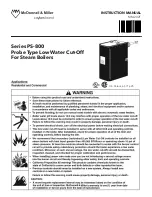
Servicing
5
Installation and maintenance instructions for wall-mounted condensing gas boiler 600 - 11S/19S/24S/24C • 02/2006
37
Subject to modifications resulting from technical improvements!
Buderus • http://www.buderus-domestic.co.uk
5.2
Fault codes
Code
Meaning
2C
Safety sensor exceeds 100 °C
Possible
cause
Action
1
Resistance in the installation is too high
Check if not all (thermostatic) radiator valves are clogged
with dirt.
2
Heating capacity is too large for the installation
Adjust the heating capacity (see subsection 2.1.10)
3
Safety sensor is faulty
Measure if resistance over the sensor is correct.
If not replace safety sensor (see subsection 5.3.11,
subsection 5.3.12, subsection 5.3.13)
4
Problem with the pump or pump cabling
(no circulation)
Check if the pump cabling is faulty or if the pump is stuck
(see subsection 5.3.9)
5
Water pressure is too low in the installation
Top up the system (see subsection 2.1.1)
Code
Meaning
2F
Temperature difference between the safety sensor and flow sensor is greater than or equal to 15 °K
Possible
cause
Action
1
Resistance in the installation is too high
Check if not all (thermostatic) radiator valves are closed or
clogged with dirt
2
Safety sensor is dirty or faulty
Check the safety sensor for dirt. Measure if resistance over
the sensor is correct. If not replace safety sensor (see
subsection 5.3.11, subsection 5.3.12, subsection 5.3.13)
3
Flow sensor is dirty or faulty
Check the sensor, replace if necessary (see subsection
5.3.14, subsection 5.3.15, subsection 5.3.16)
4
Problem with the pump or pump cabling
(no circulation)
Check if the pump cabling is faulty or if the pump is stuck.
Replace pump if necessary (see subsection 5.3.9 and
subsection 5.3.10)
5
Water pressure is too low in the installation
Top up the system (see subsection 2.1.1)
Code
Meaning
2P
Safety sensor rises faster than 5 °C/sec.
Possible
cause
Action
1
Heating capacity is too large for the installation
Adjust the heating capacity (see subsection 2.1.10)
2
Resistance in the installation is too high
Check if not all (thermostatic) radiator valves are closed or
clogged with dirt
3
Safety sensor is dirty or faulty
Check the safety sensor for dirt. Measure if resistance over
the sensor is correct. If not replace safety sensor (see
subsection 5.3.11, subsection 5.3.12, subsection 5.3.13)
4
External domestic hot water tank is too small for the
heating capacity
Top up the system (see subsection 2.1.1)
















































